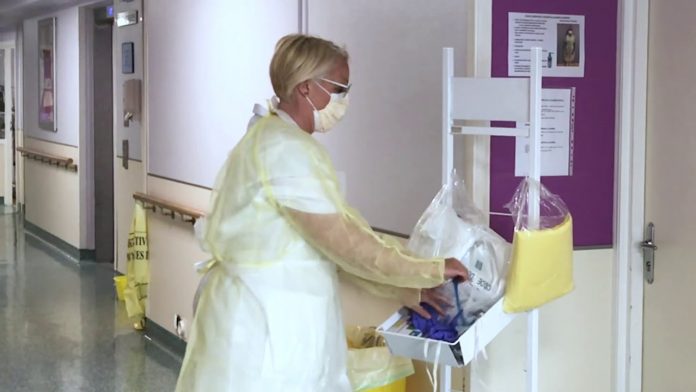Some Saskatchewan inmates are “leery” of getting vaccinated against COVID-19, says an advocate for people in Canadian prisons and jails.
Some inmates have expressed concern about the “speed” with which COVID-19 vaccines have been developed, and others feel guards should be inoculated before inmates because guards are in and out of the institutions and in the community, says Sherri Maier with Beyond Prison Walls Canada.
Inmates at the Saskatoon Correctional Centre that Maier is in contact with talk with her more about conditions at the jail than about vaccines, but inmates at the Saskatchewan Penitentiary in Prince Albert have been talking about vaccines since it was first reported earlier this month that some inmates within the federal prison system would start to get vaccinated in the first wave of clinics, Maier said.
Some inmates at the penitentiary told her they were afraid to get the vaccine, while others wondered if they’d be vaccinated and asked how officials would select who would receive the first doses.
Some of the hesitancy to get the vaccine could be due to a lack of information available to inmates, Maier says.
“They don’t really have a lot of time to sit on the phone and hear stuff from family, they don’t get newspapers there, they can watch the news. I mean, if you don’t have a TV in your cell, what are you really going to watch? Not everybody has a TV in their cell,” she said.
The Correctional Service of Canada has started vaccinations for federal prisoners who are older or considered “medically vulnerable.” But, as of last week, provinces had yet to start giving shots to inmates awaiting trial or serving shorter sentences in provincial jails.
Earlier this month, vaccine clinics were held at five institutions — the Regional Treatment Centre in British Columbia, the Regional Treatment Centre in Ontario, Drummond Institution in Quebec, Springhill Institution in Nova Scotia and the Regional Psychiatric Centre in Saskatoon.
The Saskatchewan Penitentiary, the site of one of the federal system’s largest COVID-19 outbreaks, wasn’t included in that first round of vaccinations and Maier wants to know why.
Because of a limited vaccine supply, the National Advisory Committee on Immunization recommends people in correctional centres get inoculated behind those in long-term care homes, seniors 70 and older, critical health-care workers and adults in Indigenous communities.
Saskatchewan’s ranking of vulnerable groups to get the COVID-19 vaccine has not yet been determined.
Abby Deshman, a director at the Canadian Civil Liberties Association, believes provinces should set targets for vaccinating inmates in provincial jails — something half of jurisdictions have yet to do.
“Prisoners are disproportionately impacted by health conditions that would make them very susceptible to serious illness and death as a result of COVID,” she said.
British Columbia, Ontario, New Brunswick, Prince Edward Island and Nova Scotia said that, as of last week, prisoners and staff are scheduled for vaccination in the second round of inoculations, with estimated start dates between next month and June.
Alberta, Manitoba and Quebec didn’t provide a timeline for when inmates will receive their shots. Newfoundland and Labrador said its inmates will be part of the second phase of its vaccine distribution, but didn’t specify dates.
The Northwest Territories and Yukon planned to start giving shots this week. Nunavut didn’t respond to inquiries.
Deshman was part of a research project that tracked COVID-19 cases in jails and prisons. It found that, since Dec. 1, there have been at least 1,962 infections among staff and inmates — more than all of the cases reported from last March until November.
“We should have targets for immunizing key vulnerable populations, regardless of who they are,” she said.
“If those targets need to be adjusted, if they cannot be met, that needs to be publicly communicated and explained.”
She noted some politicians, including federal Conservative Leader Erin O’Toole and Ontario Premier Doug Ford, have pushed back against early vaccinations for federal inmates.
Justin Piche, a criminology professor at the University of Ottawa, said there are far fewer older prisoners in provincial jails than in federal prisons, where one out of five inmates is 50 and older.
He said rhetoric from leaders that pits one group against another isn’t helpful.
“Prisons are among the congregate settings that are seeing significant transmission,” he said.
“You have prisoners who are getting COVID-19 at higher rates. You have prison staff that are going in and out of there on a day-to-day basis, going back to their families, going back to their communities.”
The Union of Canadian Correctional Officers believes it’s wrong that Ottawa didn’t vaccinate correctional staff along with prisoners, and instead left it up to provinces to decide where staff fall in the vaccine line.
“It’s completely foolish,” said national president Jeff Wilkins.
“We have (Saskatchewan Penitentiary), for example, which has seen quite an extensive outbreak. Our members are getting burnt out.”
As of last week, Manitoba listed provincial and federal correctional health-care workers as eligible to be vaccinated.
Wilkins wants to see correctional officers inoculated along with long-term care staff.
“In some areas, we’ve seen the rates of the institution be much higher than the community.”
Catherine Latimer, executive director of the John Howard Society of Canada, questions why doses were sent to institutions in Atlantic Canada, which have no active COVID-19 cases, while inmates in Manitoba and Saskatchewan are at higher risk for getting the virus.
Latimer is also concerned about what she says is solitary confinement-like measures being used to contain the novel coronavirus.
“It’s a very, very harsh correctional environment right now,” she said.
“We’re probably going through the worst period in terms of general corrections, at least on the federal side, in the last 50 years.”
































